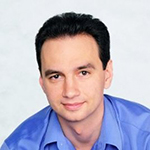Talking Travel Technology
Sergey Shebalov will speak to MLDS students about how AI concepts turn into practical industry applications while explaining his responsibilities as vice president and head of research for Sabre Corporation.
When Sergey Shebalov flies from Dallas to Chicago later this month to speak at Northwestern University, technology from his company will smooth his travels.
Shebalov is vice president and head of research for Sabre Corporation, which provides much of the intelligent technology that powers the travel industry’s mobile apps, airport check-in kiosks, and websites.

“I want to show students how complex techniques like AI make their way into the real world,” said Shebalov, who has been with Sabre for nearly 18 years. “I hope to provide insights on how they can enter the industry and start applying their academic knowledge throughout their careers.”
Shebalov’s career with Sabre started in 2007, when he was hired as a principal research analyst. In 2012, he was promoted to senior director of operational research before moving into his current position in July 2020.
Prior to his time at Sabre, Shebalov worked as a senior programmer analyst at United Airlines.
As head of research with Sabre, Shebalov is focused on integrating AI into the company’s technology.
“We are working at the forefront of cutting-edge technology,” he said. “We typically explore new ideas, developments, and advances in complex algorithms related to artificial intelligence, and we find real-world applications for these algorithms or models.”
From there, Shebalov and his team collaborate with travel-industry customers to introduce these innovations. The ultimate goal is to help travelers enjoy their trips, whether it is the flights they take, the hotels they stay in, or the experiences they have while traveling.
Shebalov's found the travel industry is a perfect place for AI to infiltrate and grow.
“One of the main requirements for adopting AI is the availability of large volumes of data, and travel has always been highly data-rich,” he said. “It’s a global industry with many stakeholders providing services to travelers, which creates a wealth of opportunities to introduce AI-driven intelligence.”
Shebalov hopes to provide a service to MLDS students by giving them deeper insight into how to use what they learn once they enter or re-enter the workforce.
He said he plans on encouraging students to stand out in three key ways when applying for post-MLDS jobs.
“First, they should be confident in what they’ve learned in school,” he said. “It’s important for us as employers to clearly understand what they bring to the table and what we can rely on.”
The second area students should focus on, Shebalov said, is gaining and showcasing a strong technical knowledge, including coding skills and a solid understanding of algorithms.
Finally, Shebalov said students should be able to demonstrate a familiarity with the businesses they are applying to join.
“They should understand the practical problems businesses are trying to solve, along with the broader business environment,” he said. “Students need to be aware of what businesses are working on, their objectives, the rules and constraints they operate within, and the metrics used to measure impact and value.”
But Shebalov’s talk will be more than a one-way information dump. Sabre has been working to establish closer ties with the academic community to foster two-way collaboration, he said.
That means Shebalov hopes to learn as much as he teaches.
“Yes, I hope to provide an industry perspective on AI development and adoption,” he said. “But it's important for both academia and industry to communicate and collaborate more. I'm looking forward to hearing some of the ideas and trends emerging from academia.”

